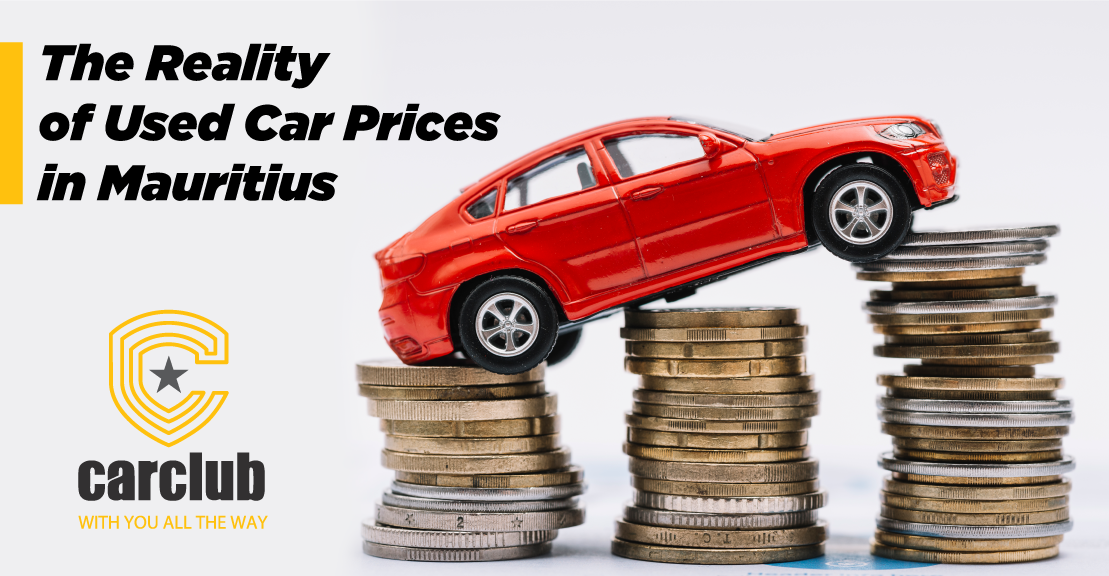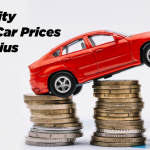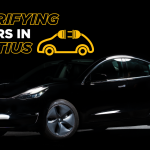
Showroom: Royal Road Helvetia, St Pierre, Mauritius

The Reality of used Car prices in Mauritius
What is happening with used cars prices?
As it is customary on our Island, worldwide trends tend to have a delayed effect in reaching our shores. It is therefore logical that our used car (and new car to a certain extent) industry is starting to feel shaken up.
In what sense you may ask? It is all about the money they say. Prices have skyrocketed in an unprecedented manner. We will try to explain why in this blog.
Reasons as to the price increases:
Whilst the issue is complicated, to say the least, and prices, at the end of the day, have always been a perception about the value of something, the following factors have all contributed to making prices of used cars what they are today:
– Foreign exchange:
Since all our loved automobiles are imported from overseas, mainly paid in US Dollars, Japanese Yen or British Pounds, the impact of the Rupee depreciation is great and in the order of 20%
– Price increase at source:
Whether in Japan or the UK, scarcity of supply of new cars due to the chip shortage issue (we will get back to that in a moment) has made second-hand very valuable indeed. Simple supply and demand rules. As a matter of fact and based on our own experiences, we are buying cars for the same price we were or even higher than a year ago, and that is for the same year of vehicles, crazy! In simple terms, the old rules of depreciation rates do not apply in this day and age.
– Increase in other costs:
Freight, storage, cost of maintenance and reconditioning, you name it, they have all gone through the roof in post-COVID times. These have a direct impact on the cost of a car and the cost of doing business as a whole.
– Local price mirroring:
It is obvious that, if the imported stuff is costing more, whatever the ‘equivalent’ on the local market, meaning a car already in Mauritius, is going to sell for a higher price. This is further exacerbated by brand new cars also being more expensive.
What does it mean for us?
Well, in short, a harder time getting the car of your dreams. Increased costs mean less stock available, since dealers’ margins have been eroded and importing does not make a business case anymore. This has a snowball effect to make things even worse.
A higher sticker price on a car will also mean higher absolute finance costs, for those purchasing their car via lease or loan, some more bad news.
As mentioned above, selling an imported vehicle may not make business sense at the moment, this would translate into less stock and less choice available in terms of models being offered. Dealers will not want to bear more risk such as experimenting with models currently not on the best sellers list.
It is also important to note that, fewer vehicles imported means less money collected from excise duties, vat and registration, which has a non-negligible effect for the country as a whole.
Is there any good at all from this situation?
In the short term maybe not, but in the long run, we think the fundamentals of the car market are changing in Mauritius, and maybe for the better.
The big winners of the moment are sellers. People who have bought a car 2-3 years ago are only suffering from very little depreciation. However, if they are changing for another car, they will very likely pay more for the new one which leaves them in a status quo.
Why do we think the industry and consumers could benefit from this in the long run? The 2nd hand industry in Mauritius was always seen as the ugly duckling. Less glamorous than buying a new car in a fancy showroom, buying second hand was often overlooked, if it wasn’t for specific models available only at recon car dealers, think hybrid cars for example.
All the issues presented above help glorify this type of vehicle and this could have a number of positive outcomes in the longer term:
- More competition with new: ultimately, new car prices should also go down and level of service, hopefully up
- More value for good cars: customers will want the maximum for their vehicles, and will only be able to get it if the vehicle has been properly taken care of with a good service and repair history
- Demand driven pricing: it is a fact pricing is a bit all over the place in Mauritius. With new demand-driven prices, perceived values will dictate prices
- Lower depreciation rates: owning a car will be cheaper than ever, with a lot more possibilities in financing innovations
What is currently being done?
Everything imported currently enjoys a 30% discount on the tax payable to the MRA, greatly helping in keeping prices lower than they should currently be. However, this budgeted measure is set to run out on 30/06/2022 and we have no visibility yet as to whether it is extended or not.
At the dealer level, believe it or not, we are working on the lowest margins possible. Breaking even is the name of the game at the moment.
We are also exploring many different avenues for diversification of supply, however, the whole world seems to have gone crazy with overused cars.
Ideally, all costs surrounding the car would decrease, tax and registration, as well as decrease the red tape to make the process of selling/buying a car much smoother, to revive the sector. If anybody from the government is reading this, feel free to hook us up!
Final words:
Yes, prices are at an all-time high. Whilst it is a shock in the short term, a fairer and more competitive car market should result in the medium term.
According to industry experts, the chip shortage problem is to continue into 2023 and beyond. Coupled with the advent of electric cars and new policies being rolled out by governments surrounding emissions, it looks like the used car market has a long way to go, albeit not at the current pricing levels.
Add a comment Cancel reply
Categories
- Career (1)
- global (5)
- Life with Cars (13)
- Motors (2)
- Tesla (1)
Recent Posts
About us

Popular Tags
Related posts


Thinking of buying a car in 2021? Read this.


Kroon Oil - The Best Engine Oil For Your Vehicle





